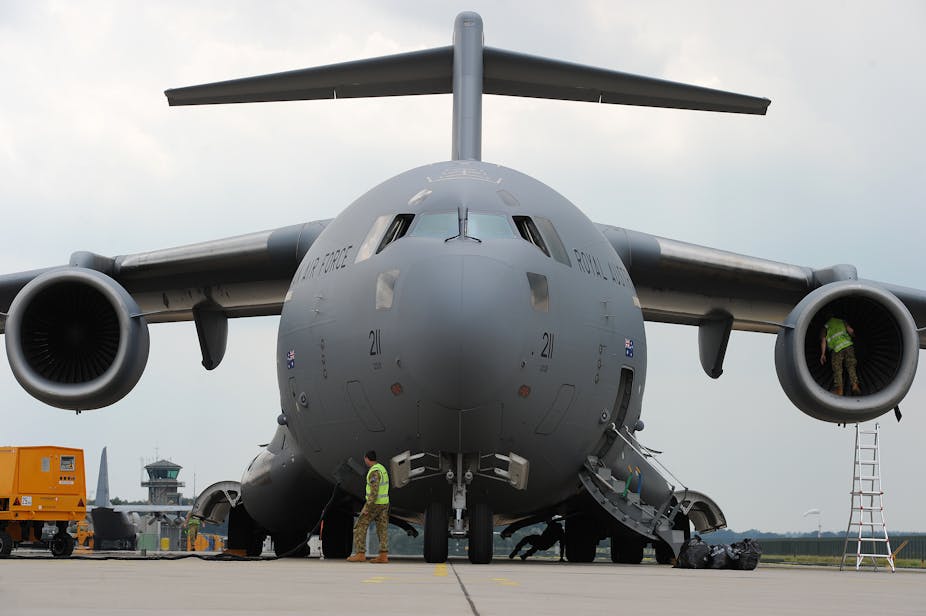The humanitarian missions by the Royal Australian Air Force in Iraq are in accordance with international law, despite a confusing statement by Iraq’s ambassador to Australia, Mouayed Saleh. But continued political scrutiny of further Australian military action, in a highly fluid situation, is wholly justified.
Prime Minister Tony Abbott announced that Australia’s airlift of light infantry weapons to Kurdish military forces battling Islamic State insurgents would be undertaken:
… at the request of the Obama administration and with the permission of the Iraqi government.
Abbott set out in his statement to the House of Representatives on Monday the criteria the government would apply in considering any requests for military action:
Is there a clear and achievable overall objective? Is there a clear and proportionate role for Australian forces? Have all the risks been properly assessed? And is there an overall humanitarian objective in accordance with Australia’s national interests?
The justification for Australia’s military commitment in Iraq therefore relies on a request from the United States, the permission of the Iraqi government, and the Australian government’s assessment that the criteria Abbott set out have been met. Does this amount to a legal basis for our commitment?
Request from the US
The legality of Australia’s response to such a request depends on whether the Iraqi government itself has authorised the United States to assemble an international coalition to assist in the struggle against Islamic State (IS).
Whether the Iraqi government has made a request in such terms is not clear. However, The New York Times has reported that former Iraqi prime minister Nouri al-Maliki asked US vice-president Joe Biden on May 16 for the United States to deploy air power against Islamic State, and followed with a written request.
Maliki’s subsequent departure does not make any difference. The request was made on behalf of Iraq. It remains valid until Iraq withdraws it. It seems fair to assume that the Iraqi government would not have restricted this request to US military forces alone.
Permission from Iraq
Does a state’s consent to other states undertaking military operations on its territory make those operations legal? Does Iraq, currently without a prime minister, have the capacity to express such consent?
International law scholars differ about whether consent is enough to make such military operations legal. As is often the case with international law, reliance on consent is based on the absence of any rule of international law stating that consent is not enough to convey legality. Article 20 of the Articles on State Responsibility, adopted by the UN International Law Commission in 2001, supports this view:
Valid consent by a State to the commission of a given act by another State which would otherwise be illegal precludes the wrongfulness of that act … to the extent that the act remains within the limits of that consent.
Consent to the use of force by another state to defeat an insurgency, such as that of IS, has been traditionally regarded as rendering legal the use of force.
Does the hiatus in the Iraqi government render Iraq capable of making “valid consent”? Prime minister-designate Haider al-Abadi has 30 days from his appointment by Iraqi president Fuad Masum on August 11 to assemble a government. This may not matter, as international law generally takes at face value the commitments made by representatives of a state unless it is “manifest” that they do not have the capacity to make such commitments.
The process of the prime minister-designate consulting about the formation of a government is part of the Iraqi constitution. The president, though a largely ceremonial figure, remains as at least a symbol of the state. Doubt about the continuing validity of Iraq’s consent may develop if the governmental hiatus is prolonged beyond the 30-day limit.
Saleh’s reported statement that “the arms and ammunition should be given to the Iraqi government” probably does not affect the international legality of Australia’s intervention. The New York Times reported that the Iraqi army is working with the Kurdish peshmerga “in a highly co-ordinated way”.
Responsibility to Protect?
Abbott’s criteria for a military intervention chime fairly closely with the criteria for a military intervention under the Responsibility to Protect doctrine, particularly as he referred to “preventable genocide” as a reason for Australia’s intervention.
The International Commission on Intervention and State Sovereignty set out the criteria for a humanitarian military intervention in 2001 as:
… seriousness of harm, proper purpose, last resort, proportionality and a favourable balance of consequences.
Responsibility to Protect is not a norm of international law, and does not justify a military intervention without UN Security Council approval. But its application here does strengthen the validity of Iraqi government consent to Australia’s military intervention.
Saleh’s statement does point to a critical question: will Australia’s future actions continue to be “within the limits” of Iraq’s consent’?

